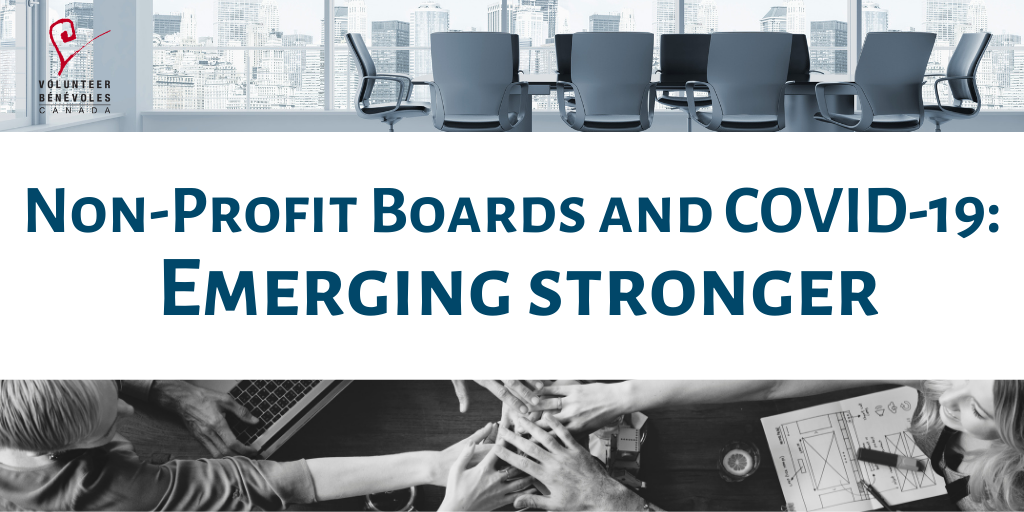
In Spring 2020, as we were managing the early stages of the COVID-19 crisis, Volunteer Canada’s blog identified key information on the Board’s role in a crisis and questions around risk management. As we move from crisis management to recovery, both in the short and long term, there continue to be key topics that should be front and centre for boards as they lead and so organizations emerge stronger.
Financial and Human Resource stability remain precarious.
Imagine Canada 2021 Sector Monitor Report indicates that:
- over 40% of charities have applied for at least one of the three major emergency supports that the federal government introduced in response to COVID-19
- 1 in 5 charities have applied for the Canada Emergency Business Account
- 68% of survey respondents note that donations are much less stable
- 60% of organizations seeing decline in volunteers and half of the charities are reporting that their staff have decreased ability to maintain a work-life balance
This creates an immense strain on an already lean sector and calls for leadership, innovation, new strategies, partnerships, collaborations and deep resilience.
In a post-pandemic world, the need remains for scenario planning, risk oversight, business continuity and disaster recovery. CPA – Chartered Professionals of Canada lists additional areas including the following that should be top of mind:
- Cybersecurity oversight
- Technology risk
- Privacy considerations related to COVID-19
- Employment standard changes and managing work refusals.
In addition, board’s may be reviewing insurance such as Volunteer Canada’s Under Our Wing, looking at a social enterprise, exploring a merger as we move onward; a proactive 360 degree view is integral.
Understanding the board’s roles and responsibilities are essential; from recruitment and onboarding to evaluation, board members are bound to:
- Diligence. Act reasonably and in good faith. Consider the best interest of the organization and its members.
- Loyalty. Place the interest of the organization first. Don’t use your position to further your personal interests.
- Obedience. Act within the scope of the law. Follow the rules and regulations that apply to the organization.
A volunteer director who fails to fulfill these duties may be liable. Volunteer Canada offers a resource to inform board members of their legal duties. It includes a “prevention checklist” to help reduce liability. Click here to view the Directors’ Liability Insurance: A Discussion Paper.
As we emerge from the pandemic, we are not the same as we were, nor should we be. We have learned from both success and failure as the community benefit sector continued to adapt and creatively meet the evolving needs; nonprofits and charities are adept in many ways but as Maya Angelou says, ‘when you know better, you do better”. The past year has shown more clearly than ever that we need to do better. Systemic issues and inequities need actionable change.
Actionable change with a fresh lens. Stanford Social Innovation Review (March 2021) article ‘Four Principles of Purpose-Driven Board Leadership’ explores the need for boards to change from traditional ways to embracing:
- Purpose before organization
- Respect for ecosystem
- Equity mindset
- Authorized voice and power
What does this mean? Here are a few questions to spark thought:
- Do organizations consider what is best for the organization or what is best for the purpose?
- Are organizations aware of the ecosystem that they exist within both formally and informally and how their actions may impact?
- Are organizations actively seeking to learn, unlearn and address inequities?
- Does board composition reflect the values, beliefs and the communities they serve?
Emerging stronger means a higher-level view of the landscape and viewing through the magnifying glass to look at our structures, systems and ourselves. Careful analysis, devising strategies to understand and address issues but also the opportunity to emerge and forge ahead with intentional change.
Are we ready? Yes. We need to be. It is time to ask the bold questions, take the bold steps and the bold action. Strong and resilient boards will tackle difficult conversations, challenge traditional ways, and prioritize a new commitment to change.
It is only the board that has the power to change itself. The time for change is now.
